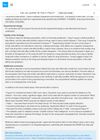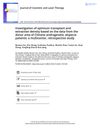
Sunekos® effectively improves labia majora appearance and is well-tolerated.
 February 2024 in “Current Drug Delivery”
February 2024 in “Current Drug Delivery” The new minoxidil emulgel with marine-based polymers shows effective controlled drug release for hair growth treatment.
 August 2023 in “Drug Delivery and Translational Research”
August 2023 in “Drug Delivery and Translational Research” Human hair keratin was used to create a scaffold that could help with skin repair.

Certain drugs, especially those for eyes, bacterial infections, imaging tests, and skin conditions, are more likely to cause itching, with differences seen across gender, age, and weight.
 April 2023 in “The journal of investigative dermatology/Journal of investigative dermatology”
April 2023 in “The journal of investigative dermatology/Journal of investigative dermatology” Ritlecitinib significantly improves scalp hair regrowth in alopecia areata patients over time.
December 2021 in “2021 International Conference on Electronic Information Technology and Smart Agriculture (ICEITSA)” Chemical dyes damage hair's internal structure more than perming, as shown by a special imaging technique.

Maidenhair fern extract may help treat COVID-19 symptoms.

The study successfully gathered a diverse group of 438 women to understand the prevalence of polycystic ovary syndrome, with most participants recruited online and at community fairs.
 April 2019 in “Journal of Investigative Dermatology”
April 2019 in “Journal of Investigative Dermatology” Allergens show specific patterns related to season, gender, and age, which can help in developing allergy avoidance plans.
 April 2019 in “Molecular Informatics”
April 2019 in “Molecular Informatics” Researchers developed reliable models to predict how well certain compounds bind to androgen receptors, emphasizing the importance of atomic electronegativity.
 August 2017 in “DOAJ (DOAJ: Directory of Open Access Journals)”
August 2017 in “DOAJ (DOAJ: Directory of Open Access Journals)” Stem cell therapies show potential for treating hair loss with fewer side effects.

Reviewers criticized the study for its assumptions, social media data collection issues, and lack of comparison to existing methods.

Reviewers criticized the study for assuming drugs with similar side-effects work the same way and questioned the validity of its findings due to potential biases and data quality issues.

Reviewers suggested the study on finding new drug uses through social media side-effects needs better methods and clearer limitations.

The peer review highlighted the need for clearer data handling, questioned the study's validity, and recognized improvements from the original version.

The study improved and was accepted despite initial concerns about data clarity, methodology, and potential overfitting.

Reviewers criticized the study's methods and suggested focusing on drug mechanisms instead of repositioning due to social media data quality concerns.
June 2015 in “Han'gug eung'yong saengmyeong hwa haghoeji/Journal of the Korean Society for Applied Biological Chemistry” Some synthesized peptides improved cell growth better than thymosin β4, VEGF, and minoxidil.

The project improved provider knowledge about PCOS but didn't significantly change diagnosis and management practices.
Yak hair stretches mainly due to macromolecules slipping past each other.
November 2022 in “The Journal of Urology” Adopting the Mark Cuban Cost Plus Drug Company pricing model could save Medicare about $1.29 billion on urological drugs.
 January 2022 in “Social Science Research Network”
January 2022 in “Social Science Research Network” A new patch that releases quercetin, copper, and zinc ions under the skin can effectively treat hair loss by promoting hair follicle regeneration.
Greater concern about hair loss is linked to more severe hair loss and worse quality of life.
 April 2020 in “Journal of Cosmetic and Laser Therapy”
April 2020 in “Journal of Cosmetic and Laser Therapy” Optimal transplant density for Chinese male hair loss patients is 35-50 hair/cm², with minimum 106.88 hair/cm² left in donor area for esthetic satisfaction.
January 2020 in “International journal of scientific and research publications”  February 2019 in “PubMed”
February 2019 in “PubMed” The most common treatment for hair loss in the study was a 5% minoxidil solution, with women more likely to receive multiple medications. A significant number of patients also had hypothyroidism.
 126 citations,
January 2010 in “British Journal of Dermatology”
126 citations,
January 2010 in “British Journal of Dermatology” Baldness is more common in Chinese men than women, increasing with age, and is influenced by genetics.
 101 citations,
May 2014 in “PLOS ONE”
101 citations,
May 2014 in “PLOS ONE” Women with PCOS have a higher chance of experiencing depression, anxiety, and sleep disorders.






















